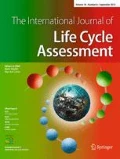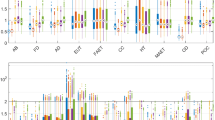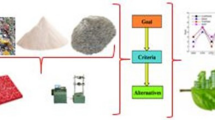Abstract
Purpose
The Higg Materials Sustainability Index (MSI) consists of five life cycle indicators to help the apparel industry inform material selection at the design stage. Until 2020, the Higg MSI applied a single score and after much debate, in 2021, indicators will no longer be aggregated. The problem of tradeoffs remains, and so this study evaluates potential aggregation approaches to help decision makers deal with tradeoffs that solve previous issues and allow for an integrated view.
Methods
Aggregation can be compensatory such as in the case of the weighted sum in the previous Higg MSI, or partially compensatory, and this relates as to how tradeoffs are managed. This study compares aggregation in the Higg MSI to four other aggregation methods via a comparative application using six textile materials (cotton, wool, PET, nylon 6, lyocell, and viscose) that, while not functionally equivalent on a mass basis, serve as an illustration of the effects of aggregation. This paper compares three compensatory aggregation methods to results from the Higg MSI—internal normalization of division by maximum, global normalization, monetization—and one partially compensatory method—stochastic multi-attribute analysis (SMAA). Methods were chosen to ensure a broad coverage according to their applicability to the Higg MSI.
Results and discussion
The comparison of raw materials using the impact categories used in the MSI Higg show tradeoffs, particularly for two materials which are the best performing materials in two impact categories and worse performing materials in the other two impact categories (out of four categories). For materials presenting tradeoffs, results show a distinct pattern between compensatory methods and SMAA. Compensatory single score methods place these materials in the lowest ranks, even lower than a material which is not the best performing material in any category. In SMAA, these same two materials rank above the mediocre material. There is a difference in how compensatory methods and partially compensatory methods handle the tradeoffs, between impacts and the resulting ranking of the materials.
Conclusions
Analysis shows that the current approach to aggregation in the Higg MSI is based on a weighted sum and, as with the other fully compensatory approaches, has three fundamental problems: linear compensation between poor and good performances, lack of accounting of mutual differences, and inverse proportionality. These problems can lead to material decisions that may enable burden shifting and unintended environmental consequences as a result of using the Higg MSI.
Recommendations
The Higg MSI needs to support companies in understanding the environmental sustainability of their products to be able to identify improvement options in a way that can adapt to the industry’s environmental concerns and business strategy. Therefore, it is recommended that the Higg MSI apply aggregation that is methodologically defensible regardless of the material in question to incentivize a healthy competition for environmental stewardship among industry members.










Similar content being viewed by others
References
Ahlroth S (2014) The use of valuation and weighting sets in environmental impact assessment. Resour Conserv Recycl 85:34–41. https://doi.org/10.1016/j.resconrec.2013.11.012
Bare J (2011) TRACI 2.0: The tool for the reduction and assessment of chemical and other environmental impacts 2.0. Clean Technol Environ Policy 13:687–696. https://doi.org/10.1007/s10098-010-0338-9
Bare J, Gloria T (2006) Critical analysis of the mathematical relationships and comprehensiveness of life cycle impact assessment approaches. Environ Sci Technol 40:1104–1035. https://doi.org/10.1021/es051639b
Bare JC, Hofstetter P, Pennington DW, de Haes HAU (2000) Midpoints versus endpoints: the sacrifices and benefits. Int J Life Cycle Assess 5:319–326. https://doi.org/10.1007/BF02978665
Bengtsson M, Steen B (2000) Weighting in LCA – approaches and applications. Environ Prog 19:101–109. https://doi.org/10.1002/ep.670190208
Brans JP, Mareschal B (2005) PROMETHEE methods. In: Figueira JR, Greco S, Ehrgott M (eds) Multiple Criteria Decision Analysis. State of the Art Surveys. Springer New York, pp 163–195
Brans JP, Vincke P, Mareschal B (1986) How to select and how to rank projects: the Promethee method. Eur J Oper Res 24:228–238. https://doi.org/10.1016/0377-2217(86)90044-5
Bruyn S De, Korteland M, Markowska A, et al (2010) Shadow Prices Handbook Valuation and weighting of emissions and environmental impacts. Delft
Buchanan J, Kock N (2001) Multiple criteria decision making in the new millennium. Lecture notes in economics and mathematical systems. In: Köksalan M, Zionts S (eds) Multiple Criteria decision making in the new millennium. Springer, pp 49–58
Castellani V, Sala S, Benini L (2016) Hotspots analysis and critical interpretation of food life cycle assessment studies for selecting eco-innovation options and for policy support. J Clean Prod 1–13. https://doi.org/10.1016/j.jclepro.2016.05.078
Ciroth A, Muller S, Weidema B, Lesage P (2016) Empirically based uncertainty factors for the pedigree matrix in ecoinvent. Int J Life Cycle Assess 21:1338–1348. https://doi.org/10.1007/s11367-013-0670-5
Edwards W, Barron FH (1994) Smarts and smarter: Improved simple methods for multiattribute utility measurement. Organ Behav Hum Decis Process 60:306–325
Finnveden G (1999) A critical review of operational valuation/weighting methods for life cycle assessment. Swedish Environ Prot Agency
Fischer G (1995) Range sensitivity of attribute weights in multiattribute value models. Organ Behav Hum Decis Process 62:252–266
Frischknecht R, Jungbluth N, Althaus H-J et al (2004) The ecoinvent database: overview and methodological framework (7 pp). Int J Life Cycle Assess 10:3–9. https://doi.org/10.1065/lca2004.10.181.1
Goedkoop M, Heijungs R, Huijbergts M et al (2009) ReCiPe 2008 . Report 1 : Characterisation
Goette L, Han H-J, Leung B (2019) Information overload and confirmation bias. Cambridge Work Pap Econ
Guinée JB (ed) (2002) Handbook on life cycle assessment operational guide to the ISO standards
Hammond J, Keeney RL, Raiffa H (1999) Smart choices. Harvard Business School Press, Boston, MA
ISO 14044 (2006) ISO 14044: Environmental Management — Life Cycle Assessment — Requirements and Guidelines. Environ Manage 3–54
Itsubo N, Murakami K, Kuriyama K et al (2015) Development of weighting factors for G20 countries—explore the difference in environmental awareness between developed and emerging countries. Int J Life Cycle Assess 1–16. https://doi.org/10.1007/s11367-015-0881-z
Kägi T, Dinkel F, Frischknecht R et al (2016) Session “Midpoint, endpoint or single score for decision-making?”—SETAC Europe 25th Annual Meeting, May 5th, 2015. Int J Life Cycle Assess 21:129–132. https://doi.org/10.1007/s11367-015-0998-0
Keeney RL (2002) Common Mistakes in Making Value Trade-Offs. Oper Res 50:935–945. https://doi.org/10.1287/opre.50.6.935.357
Lautier A, Rosenbaum RK, Margni M et al (2010) Development of normalization factors for Canada and the United States and comparison with European factors. Sci Total Environ 409:33–42. https://doi.org/10.1016/j.scitotenv.2010.09.016
Lewandowska A, Foltynowicz Z, Podlesny A (2004) Comparative lca of industrial objects part 1: lca data quality assurance — sensitivity analysis and pedigree matrix. Int J Life Cycle Assess 9:86–89. https://doi.org/10.1007/BF02978567
Lollo N, O’Rourke D (2020) Measurement without clear incentives to improve: the impacts of the higg facility environmental module (FEM) on apparel factory practices and performance. SocArXiv. https://doi.org/10.31235/osf.io/g67d8
Muller S, Lesage P, Ciroth A et al (2016) The application of the pedigree approach to the distributions foreseen in ecoinvent v3. Int J Life Cycle Assess 21:1327–1337. https://doi.org/10.1007/s11367-014-0759-5
Munda G (2016) Multiple Criteria decision analysis and sustainable development. In: Greco S, Ehrgott M, Figueira JR (eds) Multiple criteria decision analysis: state of the art surveys. New York, pp 1235–1267
Munda G, Nardo M (2009) Noncompensatory/nonlinear composite indicators for ranking countries: a defensible setting. Appl Econ 14:1513–1523. https://doi.org/10.1080/00036840601019364
Myllyviita T, Leskinen P, Seppälä J (2014) Impact of normalisation, elicitation technique and background information on panel weighting results in life cycle assessment. Int J Life Cycle Assess 19:377–386. https://doi.org/10.1007/s11367-013-0645-6
Norris GA (2001) The requirement for congruence in normalization. Int J Life Cycle Assess 6:85–88. https://doi.org/10.1007/BF02977843
Pfister S, Koehler A, Hellweg S (2009) Assessing the environmental impact of freshwater consumption in life cycle assessment. Environ Sci Technol 43:4098–4104. https://doi.org/10.1021/es802423e
Pollesch N, Dale VH (2015) Applications of aggregation theory to sustainability assessment. Ecol Econ 114:117–127. https://doi.org/10.1016/j.ecolecon.2015.03.011
Pollesch NL, Dale VH (2016) Normalization in sustainability assessment: Methods and implications. Ecol Econ 130:195–208. https://doi.org/10.1016/j.ecolecon.2016.06.018
Ponsioen TC, Vieira MDM, Goedkoop MJ (2014) Surplus cost as a life cycle impact indicator for fossil resource scarcity. Int J Life Cycle Assess 19:872–881. https://doi.org/10.1007/s11367-013-0676-z
Prado-Lopez V, Seager TP, Chester M et al (2014) Stochastic multi-attribute analysis (SMAA) as an interpretation method for comparative life-cycle assessment (LCA). Int J Life Cycle Assess 19:405–416. https://doi.org/10.1007/s11367-013-0641-x
Prado-Lopez V, Wender BA, Seager TP et al (2016) Tradeoff evaluation improves comparative life cycle assessment: a photovoltaic case study. J Ind Ecol 20. https://doi.org/10.1111/jiec.12292
Prado V, Cinelli M, Haar SF Ter et al (2019) Sensitivity to weighting in life cycle impact assessment ( LCIA ). Int J Life Cycle Assess
Prado V, Heijungs R (2018) Implementation of stochastic multi attribute analysis (SMAA) in comparative environmental assessments. Environ Model Softw 109:223–231. https://doi.org/10.1016/j.envsoft.2018.08.021
Prado V, Rogers K, Seager TP (2012) Integration of MCDA tools in valuation of comparative life cycle assessment
Prado V, Wender BA, Seager TP (2017a) Interpretation of comparative LCAs: external normalization and a method of mutual differences. Int J Life Cycle Assess 22. https://doi.org/10.1007/s11367-017-1281-3
Prado V, Wender BA, Seager TP (2017b) Interpretation of comparative LCAs: external normalization and a method of mutual differences. Int J Life Cycle Assess 22:2018–2029. https://doi.org/10.1007/s11367-017-1281-3
Rogers K, Seager TP (2009) Environmental Decision-making using life cycle impact assessment and stochastic multiattribute decision analysis: a case study on alternative transportation fuels. Environ Sci Technol 43:1718–1723. https://doi.org/10.1021/es801123h
Rogers M, Bruen M (1998) Choosing realistic values of indifference, preference and veto thresholds for use with environmental criteria within ELECTRE. Eur J Oper Res 107:542–551. https://doi.org/10.1016/S0377-2217(97)00175-6
Rowley HV, Peters GM, Lundie S, Moore SJ (2012) Aggregating sustainability indicators: beyond the weighted sum. J Environ Manage 111:24–33. https://doi.org/10.1016/j.jenvman.2012.05.004
Ryberg M, Vieira MDM, Zgola M et al (2014) Updated US and Canadian normalization factors for TRACI 2.1. Clean Technol Environ Policy 16:329–339. https://doi.org/10.1007/s10098-013-0629-z
SAC (2017) Higg Material Sustainability Index (MSI) Methodology
SAC (2020a) Sustainable Apparel Coalition. https://apparelcoalition.org/higg-product-tools/
SAC (2020b) Evolution of Higg MSI will deepen and expand focus on product-level impacts in 2021. Press Release
Sleeswijk AW, van Oers LFCM, Guinée JB et al (2008) Normalisation in product life cycle assessment: An LCA of the global and European economic systems in the year 2000. Sci Total Environ 390:227–240. https://doi.org/10.1016/j.scitotenv.2007.09.040
Stewart TJ (2008) Robustness Analysis and MCDA. In: European Working Group Multiple Criteria Decision Aiding. Newsletter of the European Working Group “Multicriteria Aid for Decisions”
Tervonen T, Lahdelma R (2007) Implementing stochastic multicriteria acceptability analysis. Eur J Oper Res 178:500–513. https://doi.org/10.1016/j.ejor.2005.12.037
Tolle D (1997) Regional Scaling and Normalization in LCIA. Int J Life Cycle Assess 2:197–208
Trucost (2015) Trucost’S Valuation Methodology
van Knippenberg D, Dahlander L, George G (2015) From the Editors: Information, Attention, and Decision Making. Acad Manag J 58:649–657
Watson KJ, Wiedemann SG (2019) Review of methodological choices in LCA-based textile and apparel rating tools : key issues and recommendations relating to assessment of fabrics made from natural fibre types. Sustainability 11:
Weidema BP, Wesnæs MS (1996) Data quality management for life cycle inventories—an example of using data quality indicators. J Clean Prod 4:167–174. https://doi.org/10.1016/S0959-6526(96)00043-1
White P, Carty M (2010) Reducing bias through process inventory dataset normalization. Int J Life Cycle Assess 15:994–1013. https://doi.org/10.1007/s11367-010-0215-0
Wulf C, Zapp P, Schreiber A et al (2017) Lessons learned from a life cycle sustainability assessment of rare earth permanent magnets. J Ind Ecol 00:1–13. https://doi.org/10.1111/jiec.12575
Author information
Authors and Affiliations
Corresponding author
Additional information
Communicated by Adriana Del Borghi.
Publisher's Note
Springer Nature remains neutral with regard to jurisdictional claims in published maps and institutional affiliations.
Supplementary Information
Below is the link to the electronic supplementary material.
Rights and permissions
About this article
Cite this article
Prado, V., Daystar, J., Wallace, M. et al. Evaluating alternative environmental decision support matrices for future Higg MSI scenarios. Int J Life Cycle Assess 26, 1357–1373 (2021). https://doi.org/10.1007/s11367-021-01928-8
Received:
Accepted:
Published:
Issue Date:
DOI: https://doi.org/10.1007/s11367-021-01928-8




